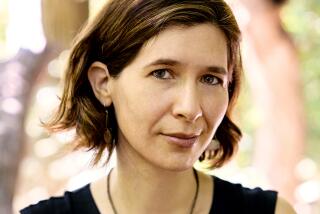Hardships in an Intimate Family Tale Worth Savoring
- Share via
Borrowed Children by George Ella Lyon (Orchard Books: $12.95, hardcover; 154 pages)
Some books are for skimming and forgetting, some for savoring and remembering. “Borrowed Children” belongs in the second category. Set in the mountains of Kentucky during the Depression, this story of a family is told by the eldest daughter, 12-year-old Amanda.
It unfolds slowly, allowing space for Lyon’s eye for detail, ear for speech, heart for understanding and willingness to let the complex characters develop in their own time. Amanda’s present-tense narration is so intimate you feel she is whispering her feelings to you.
Mama has just delivered her sixth child--probably the last thing the poor but proud Perritts need--and Mama is too sick to care for baby Willie. Amanda, the only one of the children with “pencil fever,” must drop out of school to care for Mama and Willie and to keep house for her father, two older brothers and two younger sisters.
Searching for More
Amanda does it, but resentfully. “Sometimes I think housework comes down to hot water: laundry, canning, chicken scalding,” she says, and it is not the life Amanda wants for herself. “I’ve wanted something Wish Books don’t carry.”
Just when it seems that nothing can go right for Mandy--in frustration she hurls her mother’s favorite gravy boat against the wall--she is offered a real gift: a trip to Memphis to spend Christmas with her grandparents.
Staying in a home where the table is not set but “arranged” and all the dishes match opens a new world for Mandy. But the biggest change is that she no longer has to be responsible. The center of attention for two luxurious weeks, she is for once allowed to be a child.
Listening to stories told by Omie and Opie and her Aunt Laura, Mandy pieces together her family history. Introduced to a new image of Mama as a young girl playing bridge, drinking coffee and practicing Chopin on a make-believe paper piano, Amanda wonders what happened to all of that and determines that it will not happen to her.
Through Aunt Laura, Mama’s spoiled and unconventional baby sister, Mandy begins to learn about herself. Laura is “different.” She’s married, but she doesn’t have any children. She doesn’t cook or keep house; servants do that.
This is the life Amanda wants, a life that will not require her to be a mother, to make sacrifices such as giving the best pieces of the chicken to her brothers.
“The center of things is the kitchen and the cradle,” Omie says. “Different people have different centers,” Laura argues, and Amanda wholeheartedly agrees. She has found her role model.
Laura has a dark side, however. Amanda, who has seen only the bright, romantic part--eating Coquilles St. Jacques at a fancy hotel and visiting a speak-easy on Beale Street with her flamboyant aunt--walks into an ugly scene, a drunken fight between Laura and her husband.
Amanda’s reaction is to clean up the mess, washing piles of dishes and scrubbing the floor. It’s what she has always done.
A Different Mandy
But a different Mandy returns to Goose Rock. The trip to Memphis has opened her eyes and not just to the truth about Aunt Laura.
“Now I see a family isn’t one thing or one place. Tonight I’m glad to know home is waiting. Home and the world too.”
Conventional wisdom has it that members of the TV generation, raised on high concepts and fast cuts, are so hooked on the adrenaline-high of action they won’t sit still for a thoughtful story that explores character and relishes language. It’s like comparing a fast-food hamburger to homemade chicken soup.
“Borrowed Children” is for readers more interested in flavor than in speed.
More to Read
Sign up for our Book Club newsletter
Get the latest news, events and more from the Los Angeles Times Book Club, and help us get L.A. reading and talking.
You may occasionally receive promotional content from the Los Angeles Times.









